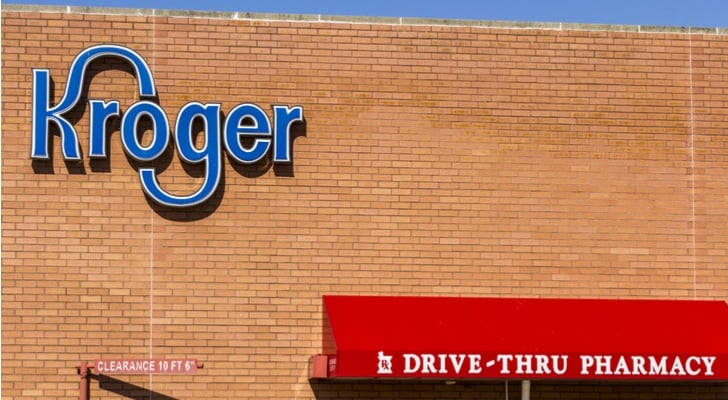Kroger (NYSE:KR) is great again. Well maybe it’s just good … or OK again.
KR reported net earnings of $2.04 billion, $2.37-per-share, and revenues of $37.5 billion for the quarter ending in May, blowing past a “whisper number” of 65 cents per share, helped by a $1.8 billion profit on the sale of its convenience stores.
Even without the sale, it had profits of $626 million, and the stock soared nearly 9% in the pre-market, opening June 21 at nearly $29-per-share.
The chain’s problems aren’t all in the rear-view mirror, but the future looks a little brighter.
KR Stock: Still Cheap as Chips
Kroger gained over $2 billion of market cap overnight, to $23.1 billion, but the shares are still cheaper than the bargain bin at Dollar General (NYSE:DG). Sales were $122 billion last year and for the quarter, they were up 3.5% year-over-year … although the company is expecting a full-year gain of just 2.5%.
If it can maintain this pace, you have a market cap of $23 billion against revenue of $125 billion, expecting profits of $2.00 to $2.15-per-share for the year. That’s still a price-to-earnings ratio of under 15.
I have been making sport of Kroger for the last year, writing that it still has no national brand identity, suggesting that it needs better marketing and some activist investors.
Like other retailers, KR stock continues to suffer from Amazon’s (NASDAQ:AMZN) ambitions, with experts like Josh Enomoto thinking Amazon will slaughter it. But while subscribing to cat litter is nice, Kroger still has many more stores than Amazon’s Whole Foods, and it has been trying to replicate some of Amazon’s infrastructure, with plans to add warehouses based on Ocado technology for its
Restock Kroger includes more self-checkouts, sensors to assure store inventory, and meal kits like Home Chef, bought in May.
I use Kroger and find it much faster than privately owned Publix, preferring another local merchant for fresh produce and fish. You may as well, if you go to Ralph’s in California, Mariano’s in Chicago or Harris Teeter in North Carolina. Those, and other chains, are all owned by Kroger. This creates confusion, as when it switched control of its unionized North Carolina operations to non-union Harris Teeter, closing some stores that competed with the other unit’s outlets, “selling” the rest to itself.
I’ll have a better opportunity to compare Kroger to the Amazon-led Whole Foods when a unit of that chain opens near me later this year. What I’m being told by friends who have used both is that the former “Whole Paycheck” is now filled with bargains, especially for Amazon Prime members, although what’s on your list may not be there due to Amazon’s inventory policies.
The Bottom Line
Kroger is the largest traditional grocery store chain left in the U.S. Its rivals are no longer similar stores like Piggly Wiggly and Winn Dixie, but companies like Walmart (NASDAQ:WMT), Costco (NASDAQ:COST) and Amazon, which do business in entirely different ways.
KR has been moving, in its ponderous way, to compete more directly with Walmart and Amazon, in delivery, pickup and meal kits. Their prepared food offerings are convenient and, while still pedestrian, nutritious and safe. You can buy their sushi and it won’t kill you.
If Kroger had a single brand identity, if it were Kroger instead of Fred Meyer in Portland, Kroger instead of Ralph’s in southern California and Kroger rather than Dillon’s in Kansas, it might get more love from investors. But it would risk the love of those loyal shoppers, and that’s the dilemma its management still faces.
Dana Blankenhorn is a financial and technology journalist. He is the author of the historical mystery romance The Reluctant Detective Travels in Time, available now at the Amazon Kindle store. Write him at danablankenhorn@gmail.com or follow him on Twitter at @danablankenhorn. As of this writing he owned shares in AMZN.

